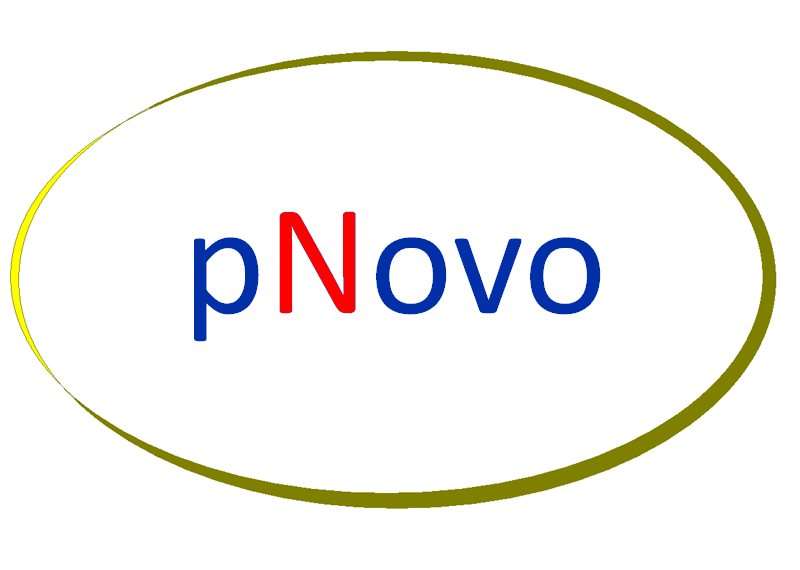pFind Studio: a computational solution for mass spectrometry-based proteomics
Introduction
Database search has long been the dominant approach to peptide and protein identification. Many database search algorithms are used in the routine proteome analysis, such as pFind, Mascot, SEQUEST, PEAKS DB. Generally, the essence of these methods is retrieving all candidate peptides from a specified database for each spectrum, which also means that a protein database is indispensable.
An alternative method is de novo peptide sequencing, which deduces peptide sequences directly from MS/MS data without any databases. De novo peptide sequencing can identify mutations, unexpected modifications and novel peptides. pNovo is a de novo peptide sequencing tool, which has been updated with multiple versions ( e.g., pNovo and pNovo+).
Figure 1. Workflow of Open-pNovo. (a) Example of an original spectrum from a peptide AN(Met[H])VR, where Met[H] denotes the methylation of Histidine residue. (b) Spectrum graph (DAG) for the original spectrum. The black edges denote the normal edges, while the red ones denote the modification ones. If we do not consider the red edge, the correct peptide cannot be obtained. (c) Normal peptides and the modified peptides are obtained by finding k longest paths in DAG. (d) Score function is trained by RankBoost using three features. (e) Candidate peptides are output and sorted by the final scores, which are obtained by RankBoost. Note that when translating the original spectrum a to the spectrum graph b, each peak is translated into two vertices rather than one vertex in panel b
Cite us
1. Open-pNovo: De Novo Peptide Sequencing with Thousands of Protein Modifications.
Hao Yang, Hao Chi, Wen-Jing Zhou, Wen-Feng Zeng, Kun He, Chao Liu, Rui-Xiang Sun, and Si-Min He.Journal of Proteome Research, 16 (2), 645–654, 2017. [abstract]
2. pNovo+: de novo peptide sequencing using complementary HCD and ETD tandem mass spectra.
Hao Chi , Hai-Feng Chen , Kun He , Long Wu , Bing Yang , Rui-Xiang Sun , Jian-yun Liu , Wen-Feng Zeng , Chun-Qing Song , Si-min He , Meng-Qiu Dong.Journal of Proteome Research, 12 (2), 615-25, 2013. [abstract]
3. pNovo: De novo Peptide Sequencing and Identification Using HCD Spectra.
Hao Chi , Rui-Xiang Sun , Bing Yang , Chun-Qing Song , Leheng Wang , Chao Liu , Yan Fu , Zuo-Fei Yuan , Hai-Peng Wang , Si-Min He and Meng-Qiu Dong.Journal of Proteome Research, 9 (5), 2713–2724, 2010. [abstract]
4. pSite: Amino Acid Confidence Evaluation for Quality Control of De Novo Peptide Sequencing and Modification Site Localization.
Hao Yang, Hao Chi, Wen-Jing Zhou, Wen-Feng Zeng, Chao Liu, Rui-Min Wang, Zhao-Wei Wang, Xiu-Nan Niu, Zhen-Lin Chen, and Si-Min He.Journal of Proteome Research, in press, 2017. [abstract]
Notice: please quote these above publications when you use pNovo software in your papers.Downloads
You can download this file user_guide.pdf, which tells you how to use pNovo.
For license application, please visit http://i.pfind.org.
pNovo v3.1 is currently free to use. Download pNovo v3.1. You can use example dataset to test pNovo. Download example dataset.
If you have any questions about it, please contact support[at]pfind.org.
Version history
| Release version | Release date | Click for more | |
|---|---|---|---|
| pNovo v3.1.5 | 2023-12-06 | Download | Release Notes |
| pNovo v3.1.4 | 2022-06-06 | Download | Release Notes |
| pNovo v3.1.2 | 2018-06-15 | Download | Release Notes |
| pNovo v3.1.1 | 2018-02-05 | Download | Release Notes |
| pNovo v3.1.0 | 2017-12-17 | Download | Release Notes |

 ®Copyright © pFind Team · Institute of Computing Technology, Chinese Academy of Sciences, Beijing, China
®Copyright © pFind Team · Institute of Computing Technology, Chinese Academy of Sciences, Beijing, China